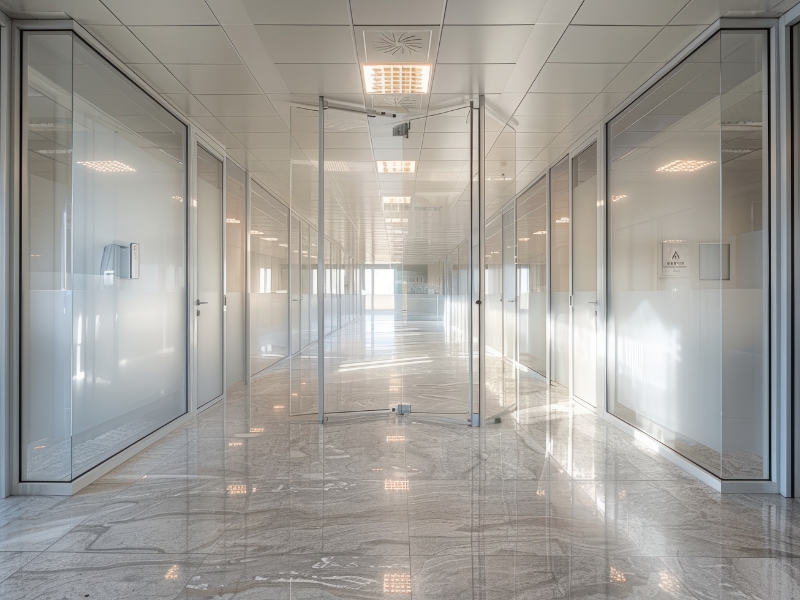Choosing the right thickness for glass partition walls isn’t just about appearance — it’s essential for functionality, safety, and comfort in the office. From privacy concerns to structural integrity, this small detail influences how your team works and how your space feels. If you’ve ever wondered why some glass walls perform better than others, thickness is likely the key factor. This article explores how and why getting the thickness right matters.
What happens when your office glass partitions are too thin?
A thin glass wall might look sleek, but it’s often where problems begin. One major issue is poor sound insulation, which allows private conversations to travel between rooms. Another concern is fragility — thinner panels are more prone to cracking or breaking, especially in high-traffic areas. Here’s what can happen with undersized glass walls:
- Limited sound control, making it hard to focus or conduct meetings
- Higher risk of damage from accidental impacts or knocks
- Reduced thermal control, affecting room comfort in summer or winter
- Less support for add-ons like blinds or decals due to structural limits
And while cost savings might seem tempting, you often spend more in the long run on replacements or fixes. One small shortcut can create ongoing disruptions across your workspace.
How does the glass partition wall thickness affect office safety?
When it comes to safety, glass thickness plays a starring role. Thicker glass panels can withstand greater force, providing better durability and protection in the event of an accident. Especially in high-traffic zones, the wrong thickness could compromise staff wellbeing.
Compliance with national safety standards is critical — these aren’t mere formalities. They help reduce injury risks:
- Toughened or laminated glass is often required for partitions near walkways
- Thicker panels are more resistant to sudden temperature changes or impacts
- The right thickness ensures the glass remains stable in metal or timber framing
- It helps meet essential safety measures for installing glass partitions in workspaces under the current Australian codes.
Neglecting these safety basics can lead to avoidable injuries, expensive legal concerns, and disruptions to business operations.
Does incorrect glass partition wall thickness cause noise issues?
If you’re still hearing every conversation next door, your partition might be to blame. Acoustic performance is one of the biggest factors affected by thickness. Thin glass panels do little to block sound, which can quickly frustrate teams trying to work or meet in peace.
That doesn’t mean you need walls as thick as bricks, but the jump from 8mm to 12mm makes a real difference. Noise bleed, echo, and overall distraction levels all drop noticeably with thicker installations. You’ll also want to factor in other elements:
- Door seals and glazing frame type
- Floor-to-ceiling gaps
- Open-plan layout versus enclosed rooms
If managing acoustics is a pain point, it’s worth enhancing office privacy with thicker glass partition walls. It’s a step that doesn’t require a full redesign — just better material choices.
Which office areas benefit from thicker glass walls?
Not all spaces need the same level of partition thickness. However, some areas significantly benefit from thicker panels, especially where foot traffic or privacy needs are high. Here are key spots where thicker glass performs better:
- Executive boardrooms and HR meeting rooms
- Reception areas with client interaction
- Collaborative zones with sliding or operable walls
- Internal entries and thoroughfares where people pass frequently
It’s also essential in zones exposed to sunlight, air conditioning, or external building movement. These conditions stress the glass more often, and thin walls won’t cope as well.
For areas requiring airflow, thicker partitions can even support design adjustments that manage temperature without compromising aesthetics — just consider how glass partition design influences air circulation across various office setups.
What are the benefits of thicker glass partition walls?
Beyond functionality, thicker partitions bring subtle yet powerful benefits. From acoustics to aesthetics, you’ll spot the changes in both performance and style.
| Feature | Thin Glass Panels | Thicker Glass Panels |
| Soundproofing | Low | High |
| Structural strength | Limited | Excellent durability |
| Privacy | Weak | Better confidentiality |
| Thermal insulation | Minimal | Moderate to good |
| Support for door systems | Basic | Fully compatible |
You’ll also find that thicker partitions open up options for customisation, from integrated blinds to double-glazing or smart glass. That means more control over how your office works, without compromising on style or light.
Can upgrading glass thickness enhance both design and function?
Absolutely — and the benefits often go hand in hand. A thicker partition doesn’t have to look bulky. Today’s designs let you pair strength with sleekness, so you get robust walls that still feel light and open.
If your fit-out is still on paper or in the early stages, it’s worth exploring reliable solutions for ideal glass partition wall thickness for offices. Choosing the right spec early saves time and ensures compatibility with your overall layout and design vision. Here’s how function and design meet in thicker panels:
- Enhanced sound control without visual clutter
- Structural integrity that supports larger or frameless panels
- Options for etched, tinted, or frosted finishes
- Support for automation and sensor-based doors
This balance of form and function means you’re not choosing between strength and elegance — you’re getting both.
Is your current glass partition wall thickness still suitable?
If your partitions are already installed, it doesn’t mean you’re locked in. Over time, office needs shift — what worked for five desks might not suit a 20-person team today. Signs it’s time to re-evaluate include:
- Noticeable sound transfer during meetings or phone calls
- Glass edges showing wear or minor cracking
- Temperature discomfort near partitions
- Vibration or rattle during door movement or air conditioning
You don’t need a total rework to make changes. Even retrofitting a few critical walls with thicker panels can change how your team works. Whether it’s about privacy, noise, or simply wear and tear, the shift often pays off fast.
Final thoughts
Glass partition wall thickness isn’t a detail to overlook. It shapes how your space functions, how safe your team feels, and how much value you get from your investment. For tailored advice, design input, or a second opinion, get in touch with Intrinsic Glass to discuss glass partition options.[/vc_column_text][/vc_column][/vc_row]

